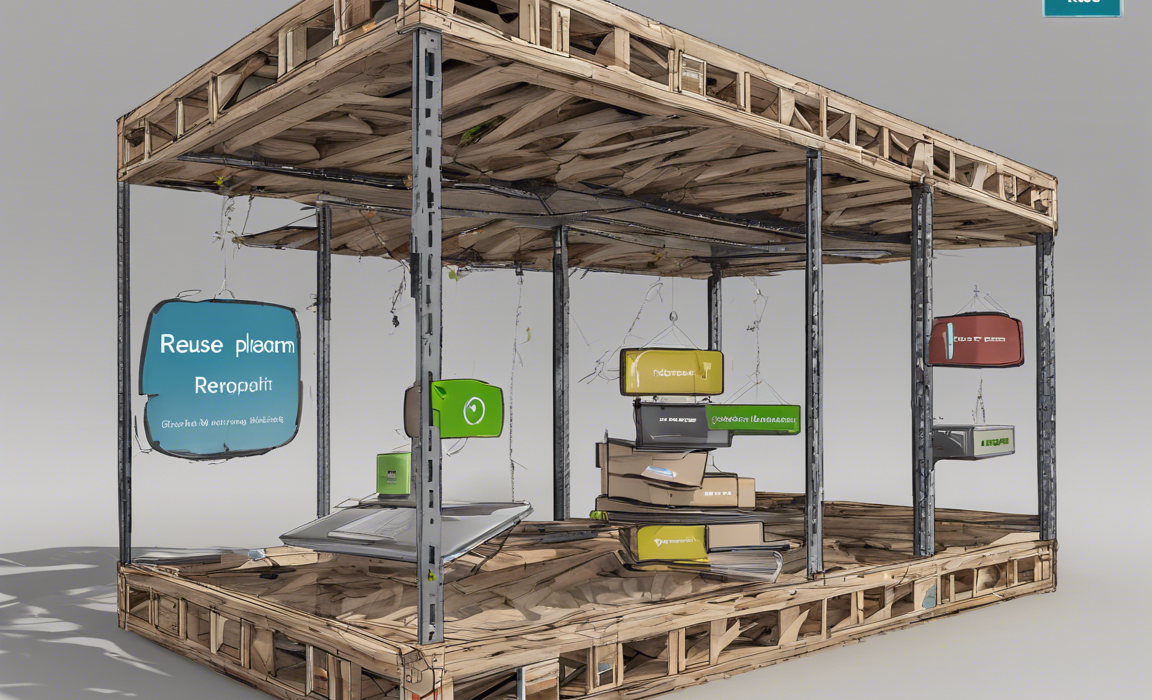In the ever-evolving world of technology, reuse platforms have emerged as essential tools for promoting sustainability and circular economy principles. These platforms provide individuals, organizations, and businesses with the opportunity to give new life to unwanted items by connecting them with those who are in need. In this article, we will delve into the concept of a reuse platform as a one-stop repository for a wide range of items, explore its benefits and challenges, and discuss how it contributes to creating a more sustainable future.
What is a Reuse Platform?
A reuse platform is an online marketplace or physical space where individuals can list items they no longer need, which are still in good condition and can be used by someone else. These items can range from clothing, furniture, electronics, books, and more. Users of the platform can browse through available items and choose the ones they are interested in acquiring. The goal of a reuse platform is to extend the lifespan of products, reduce waste, and promote a culture of sharing and community engagement.
How Does a Reuse Platform Work?
-
Listing Items: Users can create listings for items they wish to give away or sell at a reduced price. They can provide descriptions, photos, and other relevant details to attract potential recipients.
-
Browsing and Selecting: Interested individuals can browse through the listings on the platform, search for specific items, and select the ones they want to acquire.
-
Communication and Transactions: Once a selection is made, users can communicate with each other to arrange for pick-up, delivery, or shipping of the item. Transactions can be conducted either for free or at a negotiated price.
-
Reviews and Feedback: After a transaction is completed, users can leave reviews and feedback to build trust within the community and improve the overall user experience.
Benefits of Using a Reuse Platform
1. Environmental Impact
-
Reduction of Waste: By extending the lifespan of products, reuse platforms help reduce the amount of waste that ends up in landfills.
-
Resource Conservation: Reusing items reduces the demand for new products, thereby conserving resources such as raw materials, water, and energy.
2. Social Impact
-
Community Building: Reuse platforms foster a sense of community by encouraging sharing, collaboration, and mutual support among users.
-
Affordability: By offering items for free or at a reduced price, reuse platforms make goods more accessible to individuals who may not be able to afford them at retail prices.
3. Economic Impact
-
Cost Savings: Users can save money by acquiring second-hand items at lower prices compared to buying new products.
-
Income Generation: Individuals can also benefit from selling items they no longer need, generating extra income in the process.
Challenges of Implementing a Reuse Platform
While the concept of a reuse platform offers numerous benefits, there are also challenges that need to be addressed:
-
Logistics: Managing pick-up, delivery, and shipping of items can be complex and costly, especially for larger or bulkier items.
-
Quality Control: Ensuring the quality and condition of items listed on the platform can be challenging, as users may have varying standards of what constitutes ‘good condition.’
-
Legal and Regulatory Compliance: Reuse platforms need to comply with regulations related to online transactions, data privacy, and product safety.
-
User Engagement: Encouraging active participation and engagement from users to continuously list, browse, and acquire items is crucial for the success of the platform.
The Future of Reuse Platforms
As awareness of sustainability issues and the importance of circular economy practices grows, the future of reuse platforms looks promising. Innovations such as mobile applications, AI algorithms for matching users with relevant items, and blockchain technology for secure transactions are shaping the evolution of these platforms. Collaboration with governments, businesses, and NGOs can further enhance the impact of reuse platforms in reducing waste, conserving resources, and building resilient communities.
Frequently Asked Questions (FAQs)
- Are there any fees associated with using a reuse platform?
-
Some reuse platforms may charge fees for certain services such as premium listings, featured items, or transaction processing. However, many platforms offer basic services for free.
-
How can I ensure the safety of transactions on a reuse platform?
-
To ensure safe transactions, it is recommended to communicate through the platform’s messaging system, meet in public places for exchanges, and use secure payment methods if applicable.
-
Can I donate items on a reuse platform instead of selling them?
-
Yes, many reuse platforms allow users to list items for free as donations, enabling individuals to contribute to a more sustainable and sharing economy.
-
What types of items are typically not allowed on a reuse platform?
-
Items that are illegal, hazardous, counterfeit, or in poor condition are usually not allowed on reuse platforms to ensure the safety and well-being of users.
-
Do reuse platforms verify the quality of listed items?
- While some platforms may conduct quality checks or require photos of items before listing, the responsibility ultimately lies with the users to provide accurate descriptions and images.
In conclusion, reuse platforms play a vital role in promoting sustainability, resource efficiency, and community engagement. By facilitating the exchange of goods, these platforms empower individuals to contribute to a more circular economy and reduce their environmental footprint. With continued innovation and collaboration, reuse platforms have the potential to revolutionize the way we consume and interact with goods, paving the way for a more sustainable future.


